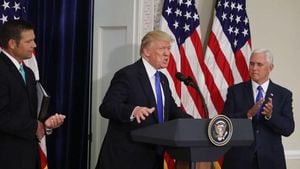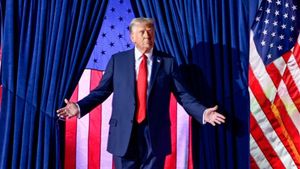With the preliminary steps for the 2024 presidential election already underway, all eyes are sharply focused on Donald Trump’s potential return to power and the wide-ranging effects it could have across the globe. Trump, who entered the 2024 race with significant momentum based on his past presidency and unwavering base of supporters, is already shaping the political narrative even before voters cast their ballots.
One of the most immediate impacts of Trump’s resurgence is his approach to international relations. During his previous term, Trump’s style was defined by unpredictable engagement and isolationist tactics, particularly when it came to alliances and trade agreements. Under his administration, the United States took bold moves, including the withdrawal from several international agreements, which has led many foreign leaders to reevaluate their diplomatic strategies.
Nationwide, the Republican Party has shown significant support for Trump, paving the way for his influence to extend beyond the United States. Politicians abroad have begun strategizing their responses to Trump's candidacy. For example, European leaders have expressed concerns about the possibility of another round of protective policies reminiscent of his first presidency, which could impact trade relations and security arrangements. Analysts observe this dynamic as they anticipate how Trump’s administration might once again challenge international norms.
Experts note the shift back to America First rhetoric is capturing the interest of right-wing parties across Europe as well. Many leaders from countries like Italy and France see Trump’s combative stance on globalization and immigration as appealing to their base, potentially influencing their internal policies. The interconnectedness of global politics means movements like these could have ripple effects reaching all corners of the globe.
While Trump’s international relationships could become adversarial, there is also the possibility of renewed engagement with non-Western powers. Trump’s past rapport with leaders such as Kim Jong-un of North Korea showcased his willingness to engage with controversial figures. International relations experts are weighing what another Trump presidency might mean for the balance of power, particularly how the U.S. might navigate its complex relationships with China and Russia.
China, eyeing Trump's campaign, is especially alert to any potential shifts. Xi Jinping’s administration has historically had to maneuver around Trump’s presidency due to trade wars and skyrocketing tariffs. Should Trump ascend to power once again, analysts suggest China could brace for renewed tension, prompting them to solidify alliances with other nations wary of U.S. influence.
On the flip side, Trump’s stance on NATO could remain equally contentious. During his first term, he frequently questioned the expense and value of American support for allies. This line is likely to reemerge, prompting European nations to re-evaluate their defense budgets and roles should Trump assume office again. Countries like Germany and France might find themselves at odds with their citizens who are reluctant to increase military spending.
Domestically, the impacts of Trump's return have already begun to shape the political tides. The GOP has reevaluated its platform, aligning closely with many of Trump’s promises on border security, economic recovery, and traditional values. Critics argue this strategic shift may alienate moderate and independent voters, particularly considering the growing population of young voters who appear less sympathetic to Trump’s often incendiary rhetoric.
Meanwhile, Trump's political machinery is rolling out with fundraising efforts already toppling records, presenting him as the most viable candidate for the presidency. This momentum not only fuels his agenda but also emboldens his supporters who see him as the solution to their demands for stringent law enforcement and stricter immigration policies.
Pundits also point out how Trump’s presidency transformed the political culture in America. His approach engaged more voters, igniting discussions around pressing issues like health care, education reform, and income inequality. With his return, there’s speculation about how he might prioritize these topics differently or ramp up old debates. His frequent questioning of electoral processes could also fuel concerns about voter security and legitimacy, increasingly prominent issues surrounding elections.
Meanwhile, social media remains central to Trump’s communication strategy. His rapid use of platforms, such as Truth Social, enables him to rally support and disseminate his messages directly to constituents without the filtering of traditional media. This tech-savvy approach allows him to maintain his relevance among younger demographics, who consume news through varied online channels.
Yet, Trump's return doesn’t come without its challenges. Legal battles still loom, with several high-profile investigations potentially clouding his campaign. Supporters rally with the mantra of injustice against their leader, potentially mobilizing the voter base. Still, critics often cite these issues as potential liabilities heading toward the election.
Looking at the broader picture, Trump’s political ambitions are more than his individual comeback; they reflect shifting power dynamics within the Republican Party and American politics as a whole. The rise of the far-right within Europe is paralleled by increased polarization and heightened partisanship back home. Voter turnout and engagement among disaffected groups could tilt the scales significantly come November 2024.
On the international stage, other leaders are preparing for the possibility of Trump returning to the Oval Office. Countries have begun to craft contingency plans to navigate the potential turbulence stemming from his policies. World leaders are aware the U.S. playing field can change dramatically with Trump, impacting everything from climate agreements to global health initiatives.
While the ramifications of Trump's candidacy are multifaceted, the anticipation of its outcome has already sparked fervor and debate across borders. The stakes are undeniably high as America prepares for what might become another contentious election year, with global observers supremely focused on the fates intertwined by Trump's political future.
History is full of twists, and as the world weathered the challenges of Trump’s presidency, many are now questioning: how will nations adapt if history repeats itself again? The unwritten chapters of the 2024 election hold deep ramifications for both the U.S. and the nations bearing witness to this dramatic spectacle.



